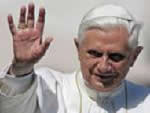|
Pope Benedict XVI- Angelus |
 Angelus Message
Angelus Message
On the Call of Matthew
"True Religion Consists in the Love of God and Neighbor"
H.H. Benedict XVI
June 8, 2008
www.zenit.org
Dear Brothers and Sisters!
At the center of the Liturgy of the Word this Sunday there is an
expression of the prophet Hosea that Jesus takes up again in the
Gospel: “I want love and not sacrifice, knowledge of God more than
holocausts” (Hosea 6:6).
We have a key word here, one that opens for us the door to the heart
of sacred Scripture. The context in which Jesus makes it his own, is
the call of Matthew, a “publican” by profession, a tax collector for
the imperial Roman authorities: Because of this he was considered a
public sinner by the Jews.
Called while he was sitting on the tax collector’s bench -- this
scene is beautifully depicted in a celebrated painting of Caravaggio
-- Jesus goes to Matthew’s house with his disciples and sits down to
dinner with other publicans. To the scandalized Pharisees Jesus
replies: “The healthy do not need the doctor but the sick do … I
have not come to call the righteous but sinners” (Matthew 9:12-13).
The Evangelist Matthew, who is always attentive to the link between
the Old and the New Testament, puts the words of Hosea’s prophecy on
Jesus’ lips: “Go, therefore, and learn the meaning of the words: ‘It
is mercy that I want and not sacrifice.’”
The importance of this expression of the prophet is such that the
Lord repeats it again in another context, in regard to the
observance of the Sabbath (cf. Matthew 12:1-8). Even in this context
he assumes the responsibility for the interpretation of this
precept, revealing himself as the “Lord” of the legal institutions
themselves.
Turning to the Pharisees he adds: “If you would have understood the
meaning of the words ‘It is mercy that I want and not sacrifice,’
you would not have condemned those who were without fault” (Matthew
12:7). So, in this pronouncement of Hosea Jesus, the Word made man,
is fully rediscovered, so to speak.
He made these words his own with all of his heart and he realized
them in his conduct even at the cost of vexing the leaders of his
people. This word of God has reached us, through the Gospels, as one
of the syntheses of the entire Christian message: True religion
consists in the love of God and neighbor. This is what gives
liturgical worship and the observance of the precepts their value.
Turning now to the Virgin Mary, let us ask through her intercession
always to live in the joy of the Christian experience. May the
Mother of Mercy, the Madonna, awaken in us the sentiments of filial
abandonment to God, who is infinite mercy; may she help us to make
our own the prayer that St. Augustine formulates in a famous passage
of the “Confessions”: “Have mercy on me, Lord! See, I do not hide my
wounds: You are my doctor, I am the sick one; you are merciful, I am
miserable. All of my hope is placed in your great mercy” (X, 28, 39;
29, 40).
[Translation by Joseph G. Trabbic]
[The Holy Father then greeted the people in several languages. In
English, he said:]
I greet all the English-speaking visitors present at today’s
Angelus, especially the group of pilgrims from Malmö in Sweden. I
pray that your visit to Rome may strengthen your faith and deepen
your love for Jesus Christ, our Lord and Saviour. In this Sunday’s
Gospel, we hear how Jesus called Matthew, the tax collector.
Immediately Matthew rose and became a follower of our Lord. Let us
be prepared to turn away from everything that separates us from God,
so that we too can respond generously to his call. Upon all of you
here today, and upon your families and loved ones at home, I invoke
God’s abundant blessings.
© Copyright 2008 -- Libreria Editrice Vaticana
Look
at the One they Pierced!
This page is the work of the Servants of the Pierced Hearts of Jesus and
Mary